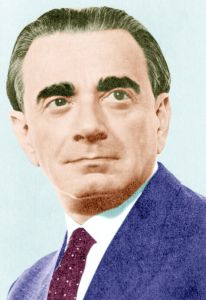|
 Miklós Rózsa's name is well known among film music aficionados and modern
classical music appreciators alike since he excelled in both and he is for
already a few decades a world recognized composer of a nothing less than
gigantic stature. Exactly today marks Maestro Rózsa's 100 year anniversary. Miklós Rózsa's name is well known among film music aficionados and modern
classical music appreciators alike since he excelled in both and he is for
already a few decades a world recognized composer of a nothing less than
gigantic stature. Exactly today marks Maestro Rózsa's 100 year anniversary.
Miklós Rózsa was born in Budapest, Hungary on April 18th 1907 to a well off
family. He started studying violin at age five and by age seven was already
doing public performances of Mozart compositions. He furthered his studies
as a pianist at the Liszt Academy in Budapest and studied formally at the
University of Leipzig where he composed a number of classical works
including his first Violin Concerto. Apart being an accomplished pianist and
a distinguished violinist Dr. Rózsa was also a skilled viola player. At a
younger age he was inspired by the music of Bartok and Kodaly and to a
certain degree also by Franz Liszt. However, according to many, including
myself it was Hungarian folk music that was Rózsa's real muse. What was to
follow these studies was a very long and very fruitful musical career. Dr
Rózsa always needed space where to expand his boundaries and this lead him
to travel from one place to another and while in Paris he attracted the
attention of Richard Strauss and Ernö von Dohnányi. He continued studying
after moving to London's Trinity College. Time to meet Alexander Korda was
getting nigh and it was the latter who gave Dr Rózsa his first film-scoring
job in 1937 namely "Knight Without Armour". Rózsa finally settled down in
California in 1940 while scoring "The Thief of Bagdad".
Rózsa had the innate ability to channel the orchestra and choirs in unison
as very few composers and conductors ever managed till the present day. The
imagery of the movies would possibly not be as remarkable was it not for the
maestro's touch of genius. His music not only accompanied but I dare say
lead the motion pictures he scored to heights no visual director would have
ever dreamed to achieve without Rózsa's highly dramatic and emotional music.
To bear witness to this magnificent marriage of visuals with music that no
words can describe and do justice to I invite you to watch again some of the
epic movies Rózsa scored throughout his career, films like 'El Cid', 'Ben
Hur', 'Quo Vadis?', 'The Golden Voyage Of Sinbad', 'Julius Caesar', 'Sodom
And Gomorrah' and 'King Of Kings', but despite the fact that the name
Miklós Rózsa usually conjures to mind the big 'biblical' sound he also
penned equally superb suspense scores for a genre he co-created, the film
noir, the scores of 'The Killers', 'Double Indemnity', 'The Asphalt Jungle'
and 'A Double Life' are pure energy and listening to them now 60 years after
their debut is not a tot less exciting than what they must have sounded like
back in the late 1940's. Alfred Hitcbcock's psychological thriller
'Spellbound' and Billy Wilder's dramatic 'The Lost Weekend' both from 1945
had a thing in common apart being two superb movies and both scores by
Rózsa, they both feature the theremin, an instrument back then still young
and this is a clear indicator that Rózsa not only was not afraid to
experiment but also that he cared to give his music fresh breathing energy.
The world has rarely seen such a motivated and serious composer, such a
skilled arranger and devoted conductor that kept on conducting his own music
until health reasons kept him from it. And today, 12 years after his
passing, the world not only has not forgotten the great genius of Miklós
Rózsa but it's finally properly celebrating his talent in this first
centennary of his birth and I am sure that one hundred years from now
someone will be sitting at whatever will be that they will use to write
articles on one hundred years from now and will be writing a second
centenary article in memory of Miklós Rózsa and his epic contribution not
only to film music but to a world's worth of music.
Selected Filmography
Knight without Armor (1936)
The Thief of Bagdad (1940)
Jungle Book (1942)
Double Indemnity (1944)
Spellbound (1945)
The Lost Weekend (1945)
Blood on the Sun (1945)
The Killers (1946)
A Double Life (1947)
Kiss the Blood Off My Hands (1948)
The Asphalt Jungle (1950)
Quo Vadis? (1951)
Ivanhoe (1952)
Julius Caesar (1953)
Lust for Life (1956)
Ben-Hur (1959)
King Of Kings (1961)
El Cid (1961)
The Power (1968)
The Golden Voyage of Sinbad (1974)
Providence (1977)
Time After Time (1979)
Dead Men Don't Wear Plaid (1982)
Godwin Borg
|





